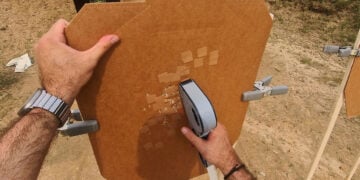
If you own your own business, in almost every state that entitles you to be able to carry a gun on the premises. In all other cases, you are on someone else’s private property. This does not explicitly deny you the right to carry concealed, but there are some good practices every concealed carrier should take before doing so.
There’s three places you can generally go in almost any job to find out if they have a policy that allows you to carry concealed during working hours and on the property. Those three places to check to see if you’re good to carry concealed are:
Employee Handbook
This is your first, best resource. Some companies are slow to update their employee handbook so don’t be surprised if there isn’t anything specifically mentioning an employee carrying a handgun with a permit. However, you need to make sure there isn’t any policy that explicitly says you can’t.
Remember, you’re a licensed concealed carrier. You’ve undergone background checks, have a clean record, and in most cases some proof of completion of a handgun safety course. Between these three things, you are an asset, not a liability.
Human Resources
Your Human Resources department should have a definitive answer to whether or not you can carry a handgun concealed on you during working hours. If they don’t know the answer, they can go find out. The good thing about addressing your Human Resources department is that they will be able to cite you a specific answer.
Make sure you have that answer documented. This can save your proverbial butt if you end up in a defensive gun situation or your carrying of a handgun gets called into question.
If your company does not have an existing concealed carry policy, use this as an opportunity to educate them on the benefits of having one.
Your Boss
Not everyone has a dedicated human resources team that can look up and investigate the answers relating to carrying a concealed handgun at work. When all else fails (or doesn’t exist) talk to your boss. If you feel you have that relationship with your boss, you might just skip the previous two and ask him.
No matter what: get the results in writing.
If your boss gives you a green light, just draft up a statement that says something to the same effect and have him sign and date it. This can be used as evidence you had permission to carry your concealed handgun on private property in the course of your profession.
Working strictly off a “handshake and a nod” is not a good way to go through with this. You need documentation. This protects you in the unlikely event your handgun is called into question at a later date.
If you end up determining you cannot carry your handgun concealed on your person while at work, the two best solutions are to securely lock it up in a container in your vehicle or have a designated secure locker at the workplace. The latter ensures you can have it when you head out to your car. The former ensures you still have access to your gun when you go home at night.
Play it smart. Make sure you have documentation on your side. Carry concealed everywhere you can.



![[FIREARM REVIEW] Ruger LCP II - Improvements to a Classic Carry Pistol](https://www.usacarry.com/wp-content/uploads/2016/11/review-ruger-lcp-2-75x75.jpg)





